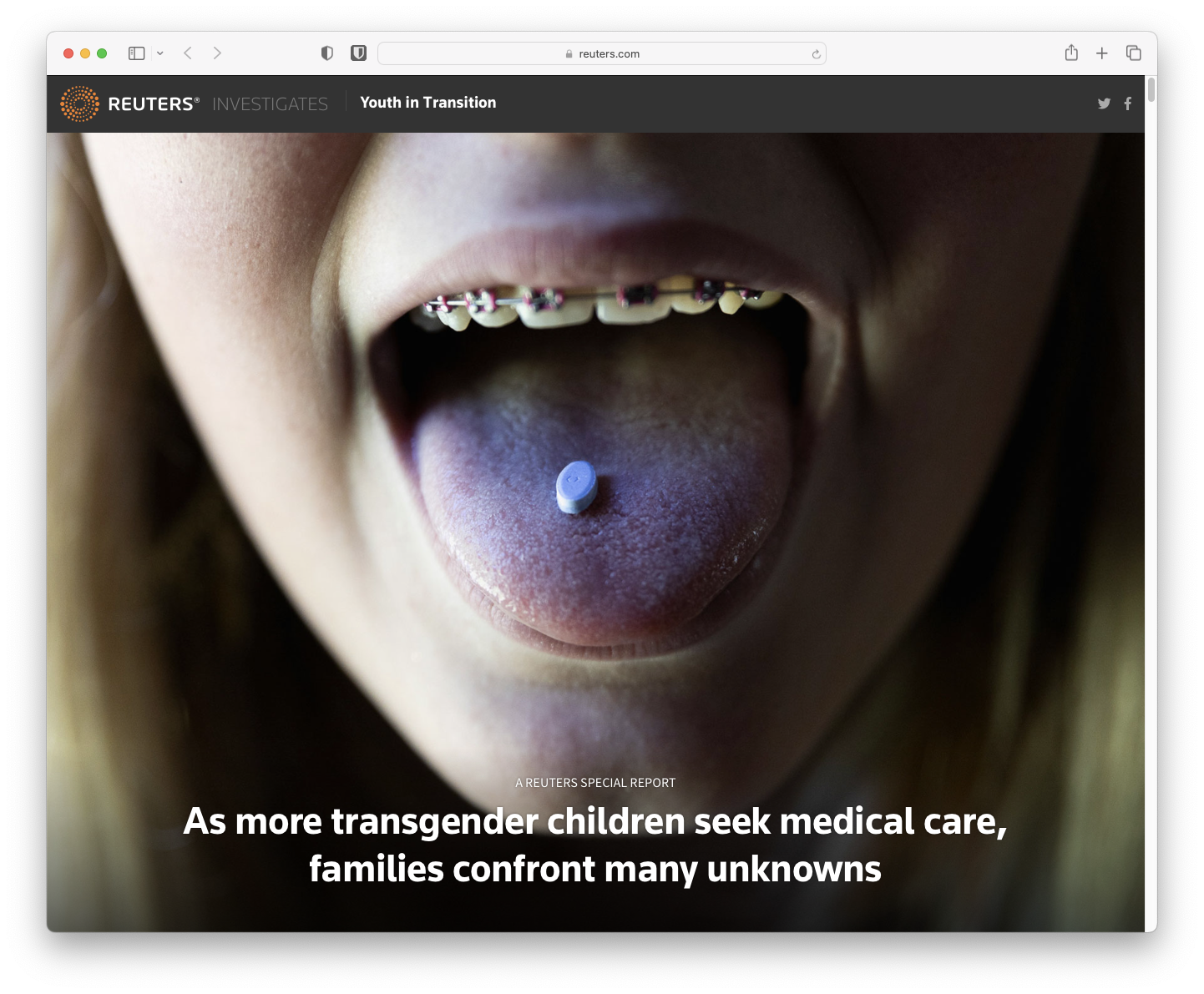
Podcast Script
From my perspective, there are things in this Reuters Special Report that I disagree with, for example, the use of the fictional phrase “sex-assigned at birth.” Sex is not assigned at birth. It is recognized at birth.
I nevertheless am glad to see the legacy media beginning to question the widespread Western practice of “gender-affirming care.” Better late than never.
Let me recite the headlines of this article and a few important paragraphs.
As more transgender children seek medical care,
families confront many unknowns.
Across the United States, thousands of youths are lining up for gender-affirming care. But when families decide to take the medical route, they must make decisions about life-altering treatments that have little scientific evidence of their long-term safety and efficacy.
...families that go the medical route venture onto uncertain ground, where science has yet to catch up with practice. While the number of gender clinics treating children in the United States has grown from zero to more than 100 in the past 15 years – and waiting lists are long – strong evidence of the efficacy and possible long-term consequences of that treatment remains scant. ----- More broadly, no large-scale studies have tracked people who received gender-related medical care as children to determine how many remained satisfied with their treatment as they aged and how many eventually regretted transitioning. The same lack of clarity holds true for the contentious issue of detransitioning, when a patient stops or reverses the transition process. The National Institutes of Health, the U.S. government agency responsible for medical and public health research, told Reuters that “the evidence is limited on whether these treatments pose short- or long-term health risks for transgender and other gender-diverse adolescents.” The NIH has funded a comprehensive study to examine mental health and other outcomes for about 400 transgender youths treated at four U.S. children’s hospitals. However, long-term results are years away and may not address concerns such as fertility or cognitive development. ----- In its latest Standards of Care, released in September, WPATH notes the paucity of research supporting the long-term effectiveness of medical treatment for adolescents with gender dysphoria. As a result, the guidelines say, “a systematic review regarding outcomes of treatment in adolescents is not possible.” The Endocrine Society, in its own guidelines, acknowledges the “low” or “very low” certainty of evidence supporting its recommendations. ----- Dr Annelou de Vries, a specialist in child and adolescent psychiatry, is one of the Dutch researchers whose early work established the importance of rigorous patient assessments before starting medical treatment. She said that while she worries about the growing number of children awaiting treatment, the graver sin is to move too fast when puberty blockers and hormones may not be appropriate. “The existential ethical dilemma in transgender care is between on one hand the (child’s) right for self-determination,” de Vries said. “On the other hand, the do-not-harm principle of medical intervention. Aren’t we intervening medically in a developing body where we don’t know the results of those interventions?” In the United States, in particular, she said, “the transgender right or child’s right seems to be put forward more strongly.” De Vries helped write the section on adolescents in WPATH’s updated Standards of Care. She said she was gratified that language stressing the importance of rigorous patient assessments remained. In interviews with Reuters, doctors and other staff at 18 gender clinics across the country described their processes for evaluating patients. None described anything like the months-long assessments de Vries and her colleagues adopted in their research. ----- Reuters interviewed parents of 39 minors who had sought gender-affirming care. Parents of 28 of those children said they felt pressured or rushed to proceed with treatment. Kate, a 53-year-old mother in New Jersey, said she and her husband were shocked in November 2020 when their 13-year-old told them he was transgender. The child, assigned female at birth, had always played with other girls and had never expressly identified as a boy. They just thought their child was a “tomboy.” Now, they learned, he had chosen a male name and wanted to start puberty blockers and get breast-removal surgery. After an initial one-on-one consultation of little more than an hour with the teen, a psychiatrist said he was a good candidate for puberty blockers, Kate said. An endocrinologist recommended the same after talking with the family for 15 minutes. Kate and her husband also attended a parents’ support group organized by a local gender therapist. Through it all, Kate said, “the message was, let your kid drive the bus. Wherever they lead you, that’s what you should do.” ----- Some gender-care professionals complain that suicide risk is too often used to pressure and even frighten parents into consenting to treatment. “I think it’s irresponsible for clinicians to do that,” said Anderson, the former president of WPATH’s U.S. chapter. “As a clinical psychologist, I don’t do a suicide assessment by membership in a class. The level of risk varies tremendously across individuals.” De Vries, the Dutch researcher, told Reuters there is no evidence that “providing care immediately leads to a decline in self harm or would prevent suicide.” ----- In a 2018 study published in the medical journal Clinical Pediatrics, researchers at Yale University noted a sharp increase in the off-label use of puberty blockers and said these drugs “have not been thoroughly investigated in populations with normally timed puberty.” In Texas earlier this year, bone scans indicated that a child, 15 years old at the time, had osteoporosis after 15 months on puberty blockers. The teen’s mother, who asked not to be identified because she works at the hospital where her child was treated, said she thought she had done everything right when her teen came out as a transgender girl. But after the bone scan results, reviewed by Reuters, she said she regretted putting her child on puberty blockers. She stopped the Lupron injections and wouldn’t agree to hormone therapy. ----- A Dec. 17, 2020, adverse event report to the FDA describes a 15-year-old patient taking Lupron for gender therapy. The patient had a history of “major depressive disorder” and a family history of depression. The patient experienced “mental health deterioration” while on Lupron and attempted suicide twice. AbbVie (a pharmaceutical co.) wrote in the report to the FDA that “there is no reasonable possibility” that the adverse events were related to Lupron. The company did not elaborate. Dr Brad Miller, division director of pediatric endocrinology at the University of Minnesota Medical School and M Health Masonic Children’s Hospital, expressed surprise at the number of adverse event reports Reuters found. He said he was particularly concerned because doctors prescribe puberty blockers for transgender children, who are already at higher risk of mental health problems. Miller and several other doctors told Reuters they had repeatedly asked AbbVie, Endo and other makers of puberty blockers to seek FDA approval for the drugs in treating gender dysphoria in children and to conduct clinical trials to establish the drugs’ safety for such use. They said the companies always declined. “They would say it would cost a lot of money to get approval,” Miller said. “And they were not interested in going there because (transgender treatment) was a political hot potato.” Source: Reuters.com
There is much more in the Reuters report. It tries to “balance” the reporting above but, from my Christian first principles perspective, I don’t see how that is possible.
Throughout the article the story of a male to “female” student named Ryace is documented. Although the vast majority of cases today are females transitioning to “male.”

Read the whole thing carefully and send me any questions you might have about my Classic Christian position on the issue.
blog@blueridgemountain.life
Companion Post
+++
What Are We Doing To Our Children?
